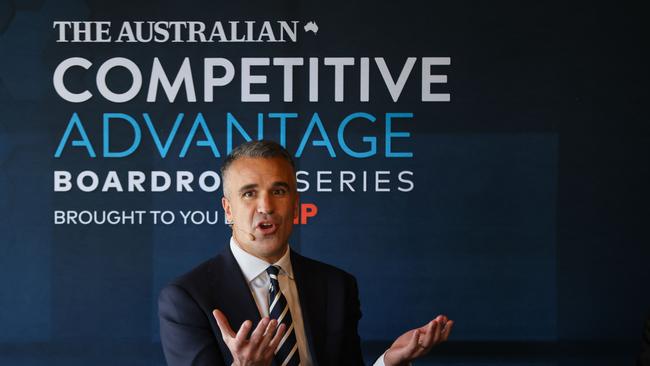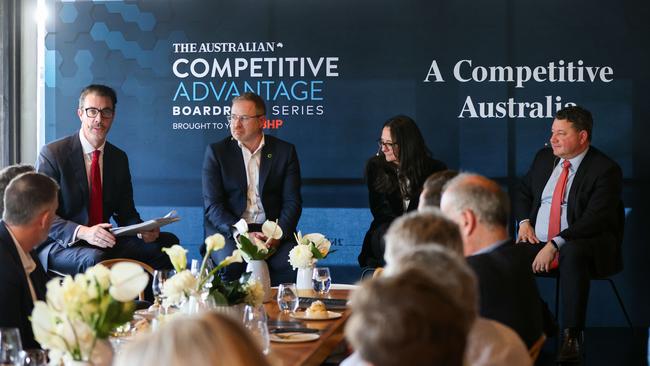Competitive Advantage: SA Premier Peter Malinauskas ‘infuriated’ by nuclear energy divide
Nuclear, gas and hydrogen power were covered at The Australian Competitive Advantage event, and SA Premier Peter Malinauskas didn’t pull any punches.

The nuclear energy fight in Australia between the far left and far right is “nuts” and the ideological divide “infuriates me”, says South Australian Premier Peter Malinauskas.
As the nation prepares to build nuclear-powered submarines in SA while nuclear power stations remain banned, Mr Malinauskas said ideological opposition to nuclear was ill-informed.
“The science of nuclear is clear,” he told The Australian Competitive Advantage series business event in Adelaide.
“It is safe, it is clean.”
Mr Malinauskas said his only opposition to nuclear power was that it was too expensive to produce, and he believed the country was not well-served by the current cultural debate on nuclear.
“You have got the far right saying ‘Aha, here we go, we’ve got ’em, … we’ve got all these lefties being opposed to nuclear, we’re going to build nuclear’,” he said.
“And then those people seem to be utterly indifferent to what it would actually mean to the cost of electricity. I think that’s nuts.”
Mr Malinauskas said the civil nuclear industry was technologically the elementary component of the nuclear cycle. “We’re skipping over that in Australia and we’re going right to the hardcore stuff,” he said. “We are going have a nuclear reactor being put in the back of a submarine.”
Yet the left-right divide remains. “You have got the left opposing it because of some NIMBY argument or some sort of ideological historical argument, or some sort of unproven safety argument in a modern context,” Mr Malinauskas said. “And then you’ve got the right saying we can prove all those lefties wrong, we’re going to get nuclear, and none of them can substantiate the economic argument for it.

“The indifference on the right to cost and the indifference on the left to science infuriates me.”
Mr Malinauskas also sees a bright future for gas and hydrogen.
“Our commitment to gas in the medium term is substantial and material, and I think gas is going to have a big role to play to get to green iron production,” he said.
“We are not at 75 per cent of renewable energy consumption in SA today in a way that is leading the world … without gas. Fact.”
In some Adelaide households today, 10 per cent of the gas coming from stove cooktops is already green renewable hydrogen. “We have got the aspiration to get that up to 20 per cent,” Mr Malinauskas said. “Hydrogen plays a role to decarbonise gas and that’s where South Australia can be a leader.
“All those people who are anti-gas aren’t going to cop any of this … We just want to make sure we are appealing to everybody else … who actually has an interest in facts.”
Mr Malinauskas said a multi-billion-dollar water program in the north of SA was a major investment in the state’s future.
SA is running a feasibility study with BHP over a plan to build water infrastructure to help service copper mines, with early estimates suggesting about $5bn will be needed to build the 260-megalitre a day desalination plant and 600km in pipelines needed to make the idea a reality.
Mr Malinauskas said he accepted community scepticism over whether state government should invest in the project, given it would primarily service private business interests. “There are two challenges. One is getting a licence politically to spend all that money on a resource that’s not a school, not a hospital, not a road,” he said.
“The second challenge is once … people accept this is an investment that’s economic in nature that will increase the state’s prosperity … you’ve got to convince people who ask a really important question about why doesn’t BHP just do it themselves? Why does it demand public investment?”
He said the plan was an important investment in SA’s future involvement in copper production as demand for the metal rises due to the need to electrify energy grids and the transport industry.
“Decarbonisation and the energy transition around it is going to be a major factor in the global economy. That means there is a lot of demand coming towards copper. And for once, when it comes to critical minerals, copper time is in South Australia,” the Premier said.
“We’ve got 70 per cent of the country’s copper resource, and the most economic copper resource. So the gods are finally shining. We didn’t have hydrocarbons and gas and coal the same as Queensland, and we didn’t get Western Australia’s hematite iron ore. But we’ve got copper … We want to seize that opportunity and we can’t get to that … without a lot of water.”



To join the conversation, please log in. Don't have an account? Register
Join the conversation, you are commenting as Logout